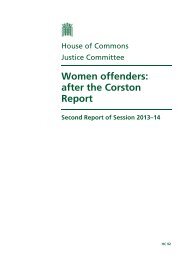Minority voices: Research into the access and acceptability of ... - MMC
Minority voices: Research into the access and acceptability of ... - MMC
Minority voices: Research into the access and acceptability of ... - MMC
- No tags were found...
You also want an ePaper? Increase the reach of your titles
YUMPU automatically turns print PDFs into web optimized ePapers that Google loves.
Good practice example 1 - Sharing Voices in BradfordSharing Voices has three broad aims: To liaise <strong>and</strong> work with statutory providers toimprove <strong>the</strong> range <strong>and</strong> quality <strong>of</strong> services. To stimulate voluntary sector activity, developcommunity capacity <strong>and</strong> support self-help groups<strong>and</strong> networks. To encourage local, national <strong>and</strong> internationaldebates about <strong>the</strong> nature <strong>of</strong> mental health, diverseperspectives <strong>and</strong> ethnicity.And seven objectives: Initiate <strong>the</strong> process <strong>of</strong> developing a mutual interestgroup (a forum in which a wide range <strong>of</strong> pr<strong>of</strong>essionals<strong>and</strong> users can come toge<strong>the</strong>r to discuss current issues<strong>and</strong> think about solutions). Promote <strong>and</strong> develop capacity <strong>and</strong> infrastructurewithin communities around mental health <strong>and</strong> wellbeing(such as recruiting local people to mental healthservices, volunteering schemes, befriending, <strong>access</strong>to employment). Engage with individuals, groups <strong>and</strong> organisations<strong>and</strong> stimulate debate <strong>and</strong> dialogue around ethnicity,mental health <strong>and</strong> well-being (demystifyingpsychiatry/mental health, legitimising critical <strong>and</strong>alternative perspectives, identifying <strong>and</strong> creating safespaces in local communities for individuals). Create a dialogue between local communities,statutory agencies <strong>and</strong> voluntary organisations <strong>and</strong>provide support <strong>and</strong> advice to o<strong>the</strong>r agencies todevelop appropriate responses for <strong>the</strong>ir client group(supporting existing organisations to boost <strong>the</strong>ircapacity in addressing needs <strong>of</strong> BME communities). Facilitate <strong>and</strong> support individuals <strong>and</strong> localcommunities to participate in national debates aboutethnicity <strong>and</strong> mental health. Signpost people <strong>and</strong> communities to appropriateagencies for support. Network with local <strong>and</strong> national service providers.Some <strong>of</strong> <strong>the</strong> work undertaken includes: Befriending – including one-to-one support forpeople who have <strong>of</strong>ten refused to <strong>access</strong> statutorymental health services. Mutual interest group – a general discussion groupdrawing toge<strong>the</strong>r mental health pr<strong>of</strong>essionals, serviceusers <strong>and</strong> carers to look at how to eradicate barriersto services. Recruitment <strong>of</strong> volunteers. Employment training <strong>and</strong> support. Self-help groups <strong>and</strong> peer support – through arange <strong>of</strong> activities including music <strong>and</strong> health <strong>and</strong>fitness (have established links with local sports centre<strong>and</strong> a group from <strong>the</strong> project go along regularlyto use <strong>the</strong> facilities). Family work <strong>and</strong> support. Faith-based support. Capacity building <strong>of</strong> local groups <strong>and</strong> voluntarysector organisations. Partnerships with non-mental health services. Advice on BME issues/awareness raising –presentations at seminars, conferences etc. Feedback to local statutory mental health servicesfrom local people.A recent development has been <strong>the</strong> linking withano<strong>the</strong>r local organisation, <strong>the</strong> Bangladeshi YouthOrganisation (BYO), where Sharing Voices works ona regular basis with young men from BYO aboutissues to do with mental health. A number <strong>of</strong> youngmen from BYO have since registered as volunteerswith Sharing Voices Bradford <strong>and</strong> are involved inrunning workshops <strong>and</strong> providing ‘safe spaces’ foryoung people to come <strong>and</strong> talk about what mentalhealth <strong>and</strong> well-being means for <strong>the</strong>m.The importance <strong>of</strong> gradually building relationshipsbased on trust is highlighted, as is beingable to respond to contexts <strong>and</strong> communitiesin imaginative <strong>and</strong> flexible ways.It is not about a ‘one size fits all’ model.07
















